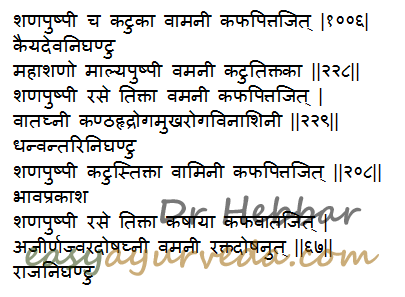Shanapushpi – Crotalaria verrucosa Uses, Research
Shanapuspi – Crotalaria verrucosa is used as an emetic herb in Vamana treatment. It is useful for treating indigestion, laryngitis, Kapha and Pitta imbalance disorders.
Botanica name- Crotalaria Verrucosa Linn.
Family- Fabaceae (Simbi kula)
Table of Contents
Classification
Kingdom – Plantae – Plants
Subkingdom – Tracheobionta – Vascular plants
Superdivision – Spermatophyta – Seed plants
Division – Magnoliophyta – Flowering plants
Class – Magnoliopsida – Dicotyledons
Subclass – Rosidae
Order – Fabals
Family – Fabaceae ⁄ Leguminosae – Pea family
Genus – Crotalaria L.– rattlebox
Species – Crotalaria verrucosa L.– blue rattlesnake
Vernacular names
Names in different languages:
English name – Blue Rattlepod, Purple popbush, Shack-shack, Blue-flowered Rattlepod
Hindi name- Sanayi, Jhanjhaniya, Jhun Jhunia (झुनझुनिया)
Marathi name- Ghagri, सागर ताग Sagar tag,
Tamil name – Gilugiluppai
Telugu name – Ghelegherinta
Kannada name – Gijigiji gida
Sanskrit Synonyms
Ghanta, Alpa Ghantika, Ghantarava- fruits with seeds inside produce sound
Ghanta pushpa, Malyapushpi, Shanaghantika, Mahashana, Sthoolaphala
Crotalaria Verrucosa chemical composition:
Flowers- A flavonol glycoside is isolated
Seeds- Crotalaburine(alkaloid)Apigenin-o-glycoside, crotaverrine,
Leaf- A necic leatone is isolated
Stem- Taraxerol, B- Sitosterol etc. from the fixed oil of stem
Classical Categorisation
Charaka-
Vamanopaga –Group of herbs useful in inducing Vamana – emesis,
Moolini – Group of herbs having roots as a medicinally used part.
Sushruta-
Urdhvabhagahara – Group of herbs useful in Dosha (morbid matters) from upper root (oral and nasal)
Kaiyadeva Nighantu – Oshadhi Varga
Bhavaprakasha Nighantu, Dhanvantari Nighantu – Guduchyadi Varga
Raja Nighantu – Shatahvadi Varga
Properties, part used, dosage
Shanapuspi Medicinal Properties
Guna (qualities) – Laghu – light to digest, Rooksha – Dryness, Teekshna – strong, piercing
Rasa (taste) – Tikta – bitter, Katu – Pungent, Kashaya – Astringent
Vipaka- Katu – Undergoes pungent taste conversion after digestion
Veerya-Ushna – Hot potency
Effect on Tridosha – Balances Kapha and Pitta Doshas.
Prabhava – Vamaka – induces vomiting.
Part used- root, leaf
Dosage– Root powder 3-6 g; leaf juice 5-10 ml.
Sanskrit verse

Uses, indications
Crotalaria verrucosa medicinal uses:
Vamani – Root induces vomiting, useful in Vamana Panchakarma treatment
Indicated in:
Kantaroga – throat disorders, laryngitis
Hrudroga – cardiac disorders
Mukharoga – oral disorders
Ajeerna – indigestion
Jwara – fever
Raktadosha – blood disorders such as abscess, skin disorders, bleeding disorders such as menorrhagia, nasal bleeding etc.
In oral ulcers, leaf decoction is used for gargling.
Side effects
Because it is an emetic, it is not suitable to use this herb in pregnancy, lactation and in children.
Interaction with medicines, supplements
Can this be used while taking Homeopathic medicine?
Yes. This product does not react with homeopathic medicine.
Can this medicine be continued while taking supplements like multivitamin tablets, Omega 3 fatty acids etc?
Yes. Generally, this product goes well with most dietary supplements. However, if you are taking more than one product per day, please consult your doctor for an opinion.
With western
medicines
Seek your
doctor’s advice if you are taking this product along with other western
(allopathic / modern) medicines. Some Ayurvedic herbs can interact with modern
medicine.
If both Ayurvedic and allopathic medicines are advised together, then it is
best to take Allopathic medicine first, wait for 30 minutes and then take the
Ayurvedic medicine.
Sthanika karma (Systemic Acton)
External use
External application of the leaf paste pacifies pitta dosha, beneficial in skin disorders. Seed paste is applied on wounds. Leaf decoction is indicated for gargling in in throat and mouth diseases.
Internally
Digestive system – Root induces vomiting. Leaf has absorbent action and decreases salivary secretion. Leaf is indicated in Amoebic dysentery.
Circulatory System – Leaf is used in blood borne diseases
Skin – Indicated in skin disorders









